介词的用法
- 格式:doc
- 大小:181.50 KB
- 文档页数:21
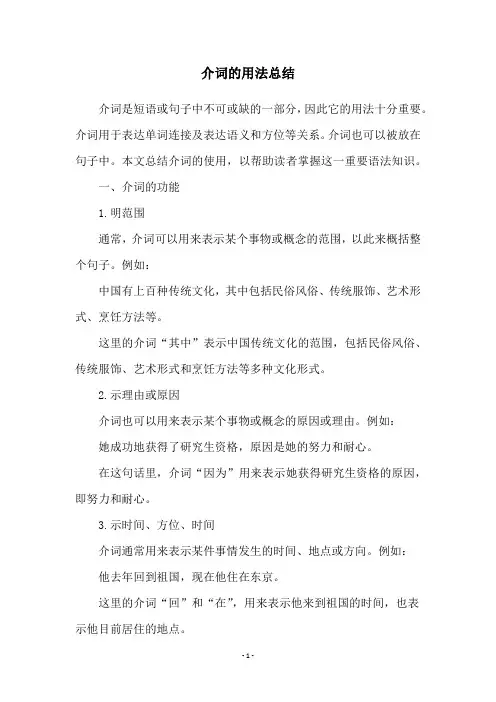
介词的用法总结介词是短语或句子中不可或缺的一部分,因此它的用法十分重要。
介词用于表达单词连接及表达语义和方位等关系。
介词也可以被放在句子中。
本文总结介词的使用,以帮助读者掌握这一重要语法知识。
一、介词的功能1.明范围通常,介词可以用来表示某个事物或概念的范围,以此来概括整个句子。
例如:中国有上百种传统文化,其中包括民俗风俗、传统服饰、艺术形式、烹饪方法等。
这里的介词“其中”表示中国传统文化的范围,包括民俗风俗、传统服饰、艺术形式和烹饪方法等多种文化形式。
2.示理由或原因介词也可以用来表示某个事物或概念的原因或理由。
例如:她成功地获得了研究生资格,原因是她的努力和耐心。
在这句话里,介词“因为”用来表示她获得研究生资格的原因,即努力和耐心。
3.示时间、方位、时间介词通常用来表示某件事情发生的时间、地点或方向。
例如:他去年回到祖国,现在他住在东京。
这里的介词“回”和“在”,用来表示他来到祖国的时间,也表示他目前居住的地点。
4.示关系介词也可以用来表示某件事情之间的关系,以及它们本身之间的关联性。
例如:他和他弟弟有着很好的关系。
这里的介词“和”,表示他和他弟弟之间的关系。
二、常用介词1.示时间和时间介词“in”、“on”、“at”可以用来表示某件事情发生的具体时间或时间段。
例如:她昨天在五点离开家。
上面这句话中,介词“in”用来表示她离开家的准确时间,即五点。
2.示方位介词“on”、“in”、“at”可以用来表示某个地方或物体在空间上的位置。
例如:她坐在车上。
这里的介词“on”用来表示她坐在车的位置。
3.示运动方向介词“to”和“from”可以用来表示一个人或物体的运动方向。
例如:他从学校走到家。
这里的介词“from”和“to”表示了他从学校走到家的运动方向。
4.示来源或原因介词“from”可以用来表示某件事情的来源或原因。
例如:她得到了诺贝尔奖,原因是她对科学的贡献。
这里的介词“from”表示了她获得诺贝尔奖的原因对科学的贡献。
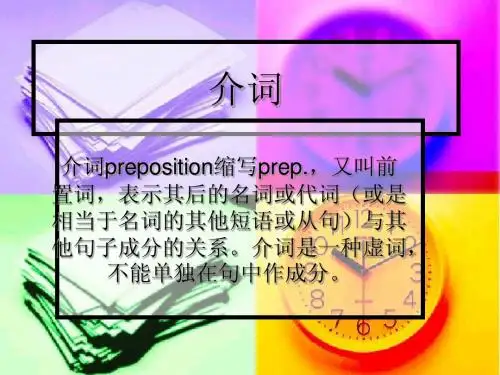
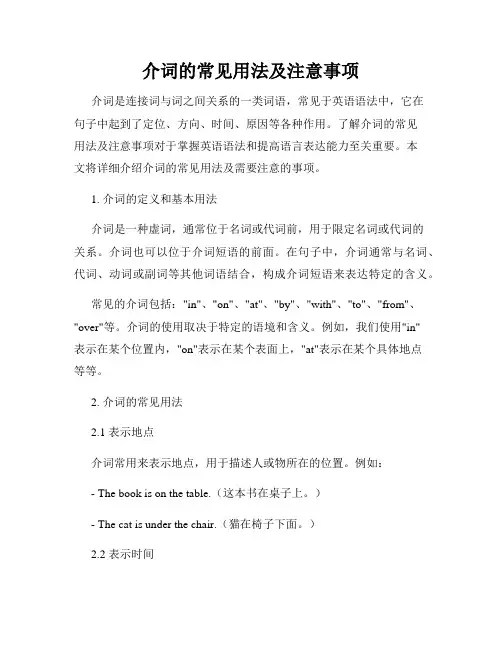
介词的常见用法及注意事项介词是连接词与词之间关系的一类词语,常见于英语语法中,它在句子中起到了定位、方向、时间、原因等各种作用。
了解介词的常见用法及注意事项对于掌握英语语法和提高语言表达能力至关重要。
本文将详细介绍介词的常见用法及需要注意的事项。
1. 介词的定义和基本用法介词是一种虚词,通常位于名词或代词前,用于限定名词或代词的关系。
介词也可以位于介词短语的前面。
在句子中,介词通常与名词、代词、动词或副词等其他词语结合,构成介词短语来表达特定的含义。
常见的介词包括:"in"、"on"、"at"、"by"、"with"、"to"、"from"、"over"等。
介词的使用取决于特定的语境和含义。
例如,我们使用"in"表示在某个位置内,"on"表示在某个表面上,"at"表示在某个具体地点等等。
2. 介词的常见用法2.1 表示地点介词常用来表示地点,用于描述人或物所在的位置。
例如:- The book is on the table.(这本书在桌子上。
)- The cat is under the chair.(猫在椅子下面。
)2.2 表示时间介词还常用来表示时间,用于描述事件发生的时间。
例如:- I will meet her at 8 o'clock.(我将在8点钟见她。
)- They usually have dinner on Sundays.(他们通常在星期天吃晚饭。
)2.3 表示方式或原因有些介词可以表示某个动作的方式或原因。
例如:- He broke the vase with a hammer.(他用锤子打碎了花瓶。
)- She cried because of the sad news.(她因为这个悲伤的消息而哭了。
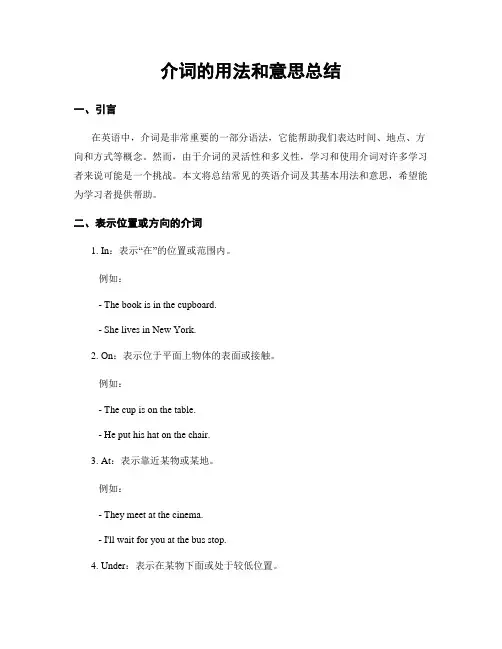
介词的用法和意思总结一、引言在英语中,介词是非常重要的一部分语法,它能帮助我们表达时间、地点、方向和方式等概念。
然而,由于介词的灵活性和多义性,学习和使用介词对许多学习者来说可能是一个挑战。
本文将总结常见的英语介词及其基本用法和意思,希望能为学习者提供帮助。
二、表示位置或方向的介词1. In:表示“在”的位置或范围内。
例如:- The book is in the cupboard.- She lives in New York.2. On:表示位于平面上物体的表面或接触。
例如:- The cup is on the table.- He put his hat on the chair.3. At:表示靠近某物或某地。
例如:- They meet at the cinema.- I'll wait for you at the bus stop.4. Under:表示在某物下面或处于较低位置。
例如:- The cat is under the table.- The box is under the bed.5. Above:表示在某物之上或较高位置。
例如:- The bird is flying above the tree.- Hang the picture above the sofa.三、表示时间的介词1. On:表示特定日期或星期几。
例如:- My birthday is on May 5th.- We have a meeting on Monday.2. At:表示具体的时刻。
例如:- The train will arrive at 9 o'clock.- I go to bed at midnight.3. In:表示时间段或月份。
例如:- I will visit my parents in summer.- She was born in January.四、表示原因和目的的介词1. For:表示动作发生的原因或目的。
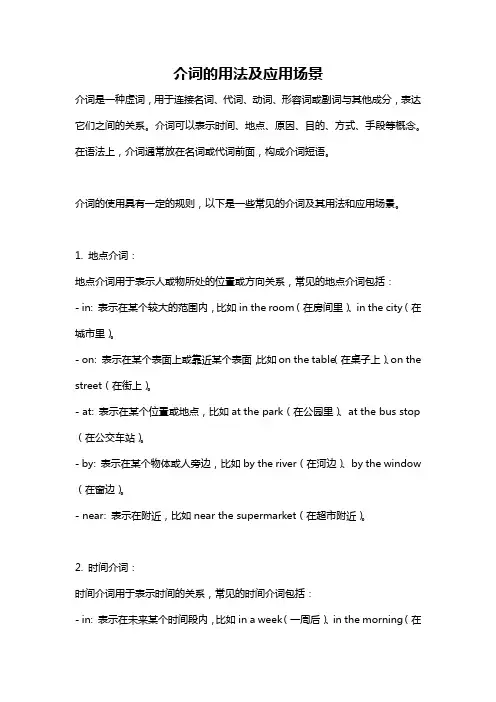
介词的用法及应用场景介词是一种虚词,用于连接名词、代词、动词、形容词或副词与其他成分,表达它们之间的关系。
介词可以表示时间、地点、原因、目的、方式、手段等概念。
在语法上,介词通常放在名词或代词前面,构成介词短语。
介词的使用具有一定的规则,以下是一些常见的介词及其用法和应用场景。
1. 地点介词:地点介词用于表示人或物所处的位置或方向关系,常见的地点介词包括:- in: 表示在某个较大的范围内,比如in the room(在房间里)、in the city(在城市里)。
- on: 表示在某个表面上或靠近某个表面,比如on the table(在桌子上)、on the street(在街上)。
- at: 表示在某个位置或地点,比如at the park(在公园里)、at the bus stop (在公交车站)。
- by: 表示在某个物体或人旁边,比如by the river(在河边)、by the window (在窗边)。
- near: 表示在附近,比如near the supermarket(在超市附近)。
2. 时间介词:时间介词用于表示时间的关系,常见的时间介词包括:- in: 表示在未来某个时间段内,比如in a week(一周后)、in the morning(在早晨)。
- on: 表示在某个具体的日期或星期几,比如on Monday(星期一)、on July 4th (7月4日)。
- at: 表示在具体的某个时间点,比如at 2 o'clock(在2点钟)、at night(在晚上)。
- during: 表示在某个时间段内,比如during the summer(在夏天)、during the meeting(在会议期间)。
3. 原因和目的介词:原因介词用于表示某个动作或情况的原因,常见的原因介词包括:- because of: 表示由于某个原因,比如because of the rain(因为下雨)。
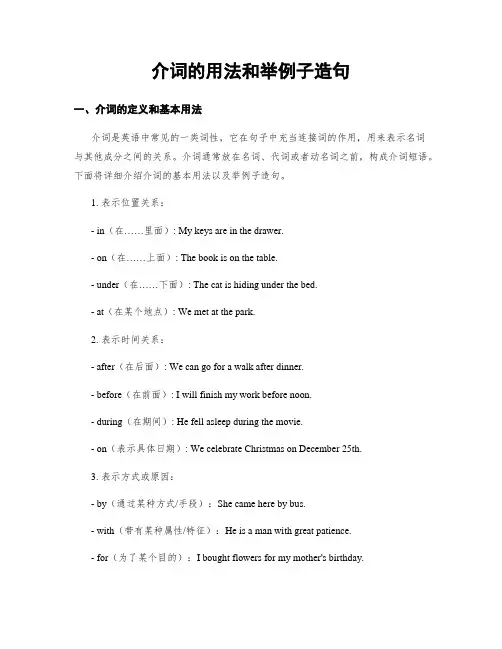
介词的用法和举例子造句一、介词的定义和基本用法介词是英语中常见的一类词性,它在句子中充当连接词的作用,用来表示名词与其他成分之间的关系。
介词通常放在名词、代词或者动名词之前,构成介词短语。
下面将详细介绍介词的基本用法以及举例子造句。
1. 表示位置关系:- in(在……里面): My keys are in the drawer.- on(在……上面): The book is on the table.- under(在……下面): The cat is hiding under the bed.- at(在某个地点): We met at the park.2. 表示时间关系:- after(在后面): We can go for a walk after dinner.- before(在前面): I will finish my work before noon.- during(在期间): He fell asleep during the movie.- on(表示具体日期): We celebrate Christmas on December 25th.3. 表示方式或原因:- by(通过某种方式/手段):She came here by bus.- with(带有某种属性/特征):He is a man with great patience.- for(为了某个目的):I bought flowers for my mother's birthday.4. 表示目的或结果:- for(给予目标对象,针对某人或某物): I bought a present for my sister.- to(到达某个地点): He went to the supermarket to buy groceries.- so as to(为了做某事): She studied hard so as to pass the exam.二、举例子造句1. 表示位置关系:- The cat is sitting in the box, enjoying its newfound hiding spot.- The painting on the wall adds a touch of color to the room.- She found her missing necklace under the pile of clothes on her bed.- I will meet you at the café near your office.2. 表示时间关系:- We can go for a walk after dinner when it's cooler outside.- Please submit your report before 5 p.m. tomorrow.- During our trip, we visited many famous landmarks in Europe.- Our anniversary falls on September 10th this year.3. 表示方式或原因:- He solved the problem by using a calculator.- She is an artist with a unique style of painting.- I bought sunscreen for protection against harmful UV rays.4. 表示目的或结果:- He brought flowers for his wife on their wedding anniversary.- They walked to school together every day, talking and laughing along the way.- She worked hard so as to achieve her dream of becoming a doctor.总结:介词是英语中常用的词性,用来表示名词与其他成分之间的关系。
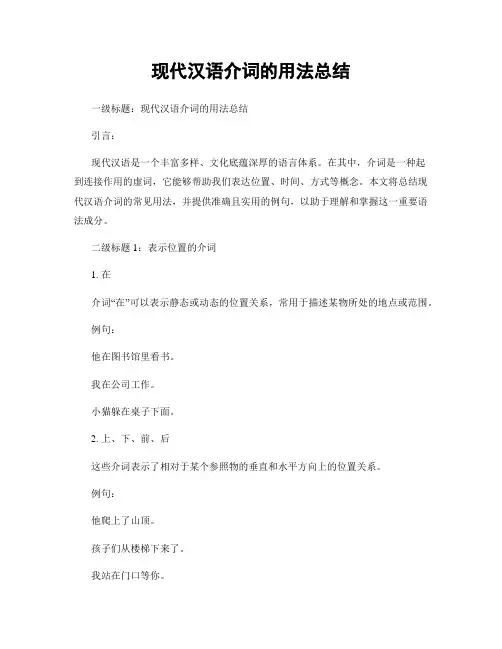
现代汉语介词的用法总结一级标题:现代汉语介词的用法总结引言:现代汉语是一个丰富多样、文化底蕴深厚的语言体系。
在其中,介词是一种起到连接作用的虚词,它能够帮助我们表达位置、时间、方式等概念。
本文将总结现代汉语介词的常见用法,并提供准确且实用的例句,以助于理解和掌握这一重要语法成分。
二级标题1:表示位置的介词1. 在介词“在”可以表示静态或动态的位置关系,常用于描述某物所处的地点或范围。
例句:他在图书馆里看书。
我在公司工作。
小猫躲在桌子下面。
2. 上、下、前、后这些介词表示了相对于某个参照物的垂直和水平方向上的位置关系。
例句:他爬上了山顶。
孩子们从楼梯下来了。
我站在门口等你。
3. 中间、旁边、左右这些介词用来加强对待速和空间位置之间关系的描述,常与名词连用,表示两者之间紧密相关或相邻。
例句:他坐在我中间。
书架的旁边放着一些杂志。
左右两个选项都是正确的。
二级标题2:表示时间的介词1. 在介词“在”可以用来表示某个事件或动作发生的时间点、持续的时间或某个阶段内。
例句:我们在七点钟吃早饭。
我在一个小时内完成了作业。
他在这段时间里遇到了很多挑战。
2. 从…到…这个结构常常用于描述一个行动或事件发生的起始和结束时间。
例句:我们每天上学从八点开始到十二点结束。
公司工作日从星期一到星期五。
3. 在…之前/之后这些介词通过与名词、时态结合,表达事件或行动相对于特定时间点之前或之后发生的关系。
例句:我昨天晚上睡觉之前看了一会儿电视。
我们等待了半个小时,直到老师来之后才开始上课。
二级标题3:表示方式和原因的介词1. 以…方式/方法这个结构常用于描述某种行为或做某事时的方法或方式。
例句:她以微笑的方式回答了我的问题。
我们应该用积极努力的方法面对困难。
2. 因为/由于这些介词用来表达造成某事发生的原因。
例句:他没来是因为生病了。
由于下雨,比赛被取消了。
三级标题:总结与展望通过本文对现代汉语介词的用法进行总结,我们可以看到,介词在汉语中起着连接各种概念的重要作用。
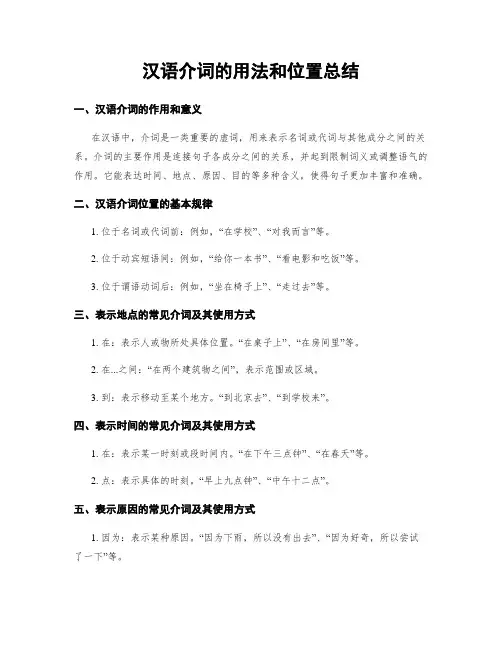
汉语介词的用法和位置总结一、汉语介词的作用和意义在汉语中,介词是一类重要的虚词,用来表示名词或代词与其他成分之间的关系。
介词的主要作用是连接句子各成分之间的关系,并起到限制词义或调整语气的作用。
它能表达时间、地点、原因、目的等多种含义,使得句子更加丰富和准确。
二、汉语介词位置的基本规律1. 位于名词或代词前:例如,“在学校”、“对我而言”等。
2. 位于动宾短语间:例如,“给你一本书”、“看电影和吃饭”等。
3. 位于谓语动词后:例如,“坐在椅子上”、“走过去”等。
三、表示地点的常见介词及其使用方式1. 在:表示人或物所处具体位置。
“在桌子上”、“在房间里”等。
2. 在...之间:“在两个建筑物之间”,表示范围或区域。
3. 到:表示移动至某个地方。
“到北京去”、“到学校来”。
四、表示时间的常见介词及其使用方式1. 在:表示某一时刻或段时间内。
“在下午三点钟”、“在春天”等。
2. 点:表示具体的时刻。
“早上九点钟”、“中午十二点”。
五、表示原因的常见介词及其使用方式1. 因为:表示某种原因。
“因为下雨,所以没有出去”、“因为好奇,所以尝试了一下”等。
2. 由于:与“因为”意义相近,强调较正式或客观的情况。
六、表示目的的常见介词及其使用方式1. 为了:表示某种目的。
“为了提高成绩,他每天都很努力学习”、“我想去美国留学,只是为了拓展视野”。
七、其他常见介词用法总结1. 和:连接并列名词或代词。
“和父母一起”、“和朋友交流”等。
2. 对于:引导宾语或被动对象。
例如,“对于这个问题,我没有答案。
”3. 对...来说:表示针对特定人群、个体等而言。
“对我来说非常重要”的意思是指在我看来很重要。
结语:汉语介词在句子中有着极其重要的作用。
通过正确运用介词,我们可以更加准确地表达自己的意思,并增加句子的表达力。
在实际运用中,我们应该熟练掌握介词的基本规律和常见用法,并根据需要灵活运用。
通过不断积累使用经验,我们能够更加自如地运用介词,使我们的汉语表达更加清晰、准确。
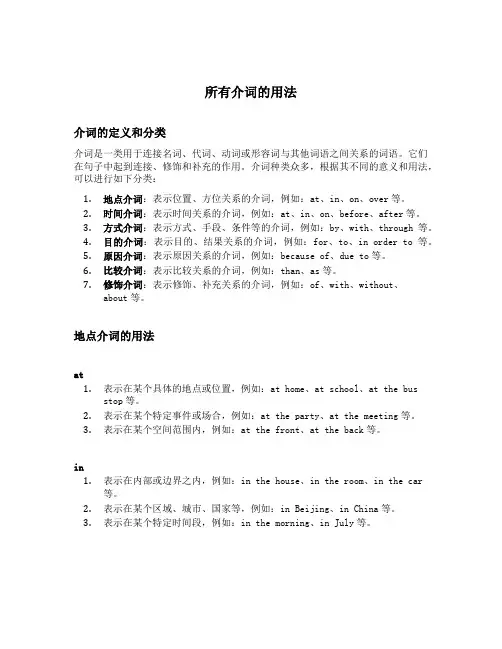
所有介词的用法介词的定义和分类介词是一类用于连接名词、代词、动词或形容词与其他词语之间关系的词语。
它们在句子中起到连接、修饰和补充的作用。
介词种类众多,根据其不同的意义和用法,可以进行如下分类:1.地点介词:表示位置、方位关系的介词,例如:at、in、on、over等。
2.时间介词:表示时间关系的介词,例如:at、in、on、before、after等。
3.方式介词:表示方式、手段、条件等的介词,例如:by、with、through等。
4.目的介词:表示目的、结果关系的介词,例如:for、to、in order to等。
5.原因介词:表示原因关系的介词,例如:because of、due to等。
6.比较介词:表示比较关系的介词,例如:than、as等。
7.修饰介词:表示修饰、补充关系的介词,例如:of、with、without、about等。
地点介词的用法at1.表示在某个具体的地点或位置,例如:at home、at school、at the busstop等。
2.表示在某个特定事件或场合,例如:at the party、at the meeting等。
3.表示在某个空间范围内,例如:at the front、at the back等。
in1.表示在内部或边界之内,例如:in the house、in the room、in the car等。
2.表示在某个区域、城市、国家等,例如:in Beijing、in China等。
3.表示在某个特定时间段,例如:in the morning、in July等。
on1.表示在某个表面或平面上,例如:on the table、on the floor、on thewall等。
2.表示在某个日期或具体的时间点,例如:on Monday、on January 1st等。
3.表示在某个交通工具上,例如:on the bus、on the train等。
over1.表示在某个位置的上方,例如:over the bridge、over the sky等。
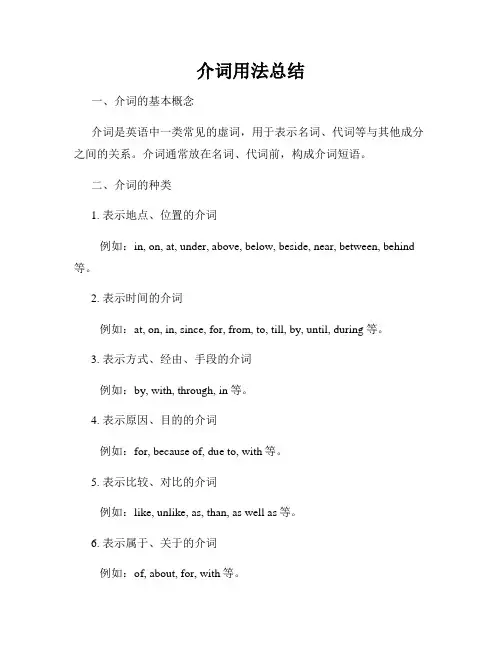
介词用法总结一、介词的基本概念介词是英语中一类常见的虚词,用于表示名词、代词等与其他成分之间的关系。
介词通常放在名词、代词前,构成介词短语。
二、介词的种类1. 表示地点、位置的介词例如:in, on, at, under, above, below, beside, near, between, behind 等。
2. 表示时间的介词例如:at, on, in, since, for, from, to, till, by, until, during等。
3. 表示方式、经由、手段的介词例如:by, with, through, in等。
4. 表示原因、目的的介词例如:for, because of, due to, with等。
5. 表示比较、对比的介词例如:like, unlike, as, than, as well as等。
6. 表示属于、关于的介词例如:of, about, for, with等。
7. 表示从属关系的介词例如:of, for, to等。
8. 表示引导句子成分的介词(介词短语作为从句的引导词)例如:in, on, by, with, after, before, until等。
三、介词的使用规则1. 表示地点、位置的介词:a) in表示在范围、区域内;b) on表示在平面上或接触面上;c) at表示确切的位置;d) under表示在底下,在下面;e) above表示在上面;f) below表示在下面。
2. 表示时间的介词:a) at用于特定时间点;b) on用于具体的某一天或日期;c) in用于月份、季节、年代、较长时间段。
3. 表示方式、经由、手段的介词:a) by表示靠近、通过手段或方式;b) with表示伴随、带有;c) through表示穿过、经由。
4. 表示原因、目的的介词:a) for表示出于某种原因;b) because of和due to表示由于;c) with表示具备某种目的。
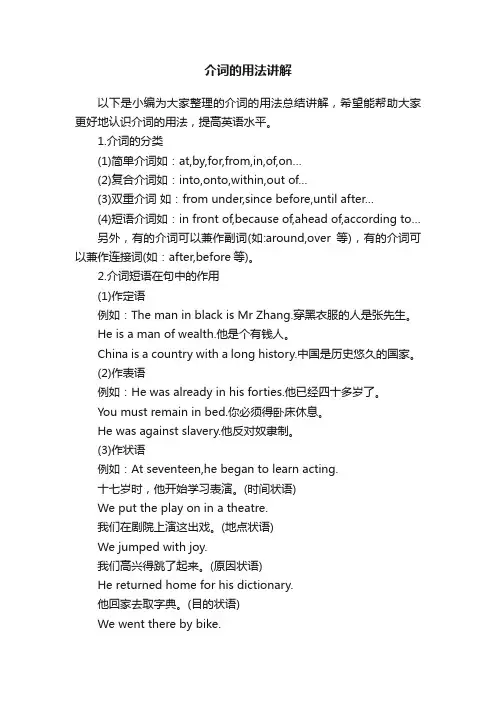
介词的用法讲解以下是小编为大家整理的介词的用法总结讲解,希望能帮助大家更好地认识介词的用法,提高英语水平。
1.介词的分类(1)简单介词如:at,by,for,from,in,of,on…(2)复合介词如:into,onto,within,out of…(3)双重介词如:from under,since before,until after…(4)短语介词如:in front of,because of,ahead of,according to…另外,有的介词可以兼作副词(如:around,over等),有的介词可以兼作连接词(如:after,before等)。
2.介词短语在句中的作用(1)作定语例如:The man in black is Mr Zhang.穿黑衣服的人是张先生。
He is a man of wealth.他是个有钱人。
China is a country with a long history.中国是历史悠久的国家。
(2)作表语例如:He was already in his forties.他已经四十多岁了。
You must remain in bed.你必须得卧床休息。
He was against slavery.他反对奴隶制。
(3)作状语例如:At seventeen,he began to learn acting.十七岁时,他开始学习表演。
(时间状语)We put the play on in a theatre.我们在剧院上演这出戏。
(地点状语)We jumped with joy.我们高兴得跳了起来。
(原因状语)He returned home for his dictionary.他回家去取字典。
(目的状语)We went there by bike.我们骑自行车去那儿的。
(方式状语)In spite of the heavy rain,they arrived.尽管雨下得大,他们还是到了。
五个介词的用法一、at,in,on 的用法区别1. at 用于具体地点前,in 用于表示地点,范围,in 后面常接国家。
in the street,on the street,两个短语都在路上。
at 用在小地点前。
例如:在房里、在教室、在机场等,其具体用法是at 在早上、中午、晚上前,其中午的具体时间是x时左右,而在中午,其时间可说明是下午。
at 的短语可用作冠词或表时间。
at 表时间时可译为“在某一时刻,一点”,后面一般加morning(早晨),noon(中午),night(晚上),nighttime(晚上)。
in 后面接年、月、季节或段时间,也可以接大地点。
如in+年/月/星期,一般主语指抽象概念。
例如:他在1996年参加了那次会议。
而不能说在月份中用介词in,只能说在某月某日用介词on。
再如:我在上海等我朋友,这句话中用到了介词on,表示在某一天或某一天的上午、下午和晚上时也用on。
2. on 表示某一点时,相当于at或in加表时间的名词前。
例如:他坐在教室的前排。
这句话中用到了介词on。
二、beside 和next to 的区别beside 表示在某人或某物旁边,其主语是物时,介词不能省略。
next to 表示紧挨着某人或某物,其主语是人或物。
例如:Tom sat beside me.这句话中用了介词beside,表示汤姆坐在我的旁边。
与汤姆相邻的物体上有一本书掉了下来,它把汤姆压伤了,如果使用next to这个短语的话不能表示出书掉下来这一情景。
三、by 和经过的区别by 主要用于被动语态中表示通过某种方式。
常用句型为:某人或某物被做某事。
另外还表示不迟于某个时间点。
例如:你吃早饭了吗?我们不迟于下周四见吧!而经过的意思是用“从”表示位置变化时的一种方式,“从……经过”可由“with+宾语+表示动作的动词-ing”来充当。
with后有宾语时可以与by连用。
by还可以用在时间上表示“不迟于某个时间点”,如by now.而表示动作的方向时by后可以跟副词和某些名词构成短语,意为“通过某种方式”。
介词的含义及用法
介词(preposition)是一种用来表示词与词、词与句之间关系的词,在句中不能单独作句子成分。
介词后面一般有名词代词或相当于名词的其他词类,短语或从句作它的宾语。
介词和它的宾语构成介词词组,在句中作状语,表语,补语或介词宾语。
介词的用法包括:
- 表示时间,地点,方式,原因,目的,对象等。
- 用来连接句子中的各个成分,形成复杂的句子结构。
- 用来表达比较关系,如“像”,“比”,“与...相比”等。
- 用来表达被动语态,如“被”,“由”,“为...所”等。
- 用来引导定语从句,状语从句等。
例如,在句子“我在家里学习”中,“在”是一个介词,用于表示地点,连接了“我”和“家里”这两个成分。
在句子“我通过阅读来学习”中,“通过”是一个介词,用于表示方式,连接了“阅读”和“学习”这两个成分。
介词的用法非常灵活,需要根据具体语境和表达意图来选择合适的介词。
同时,介词的用法也需要与其他词类和语法结构相结合,才能形成完整的句子表达。
介词的用法总结:一、表示时间的介词1 、at 、on 、in :——口诀“at 时间点,有on 必有天,in 指月季年”① at 用于某一具体时刻或重大节日之前② on 用在具体某一天或某天的上午、下午、晚上之前③ in 用在年、周、日、季节或泛指的上午、下午、晚上前2 、before 、afterbefore 表示“ 在某时刻或某件事之前” ,after 用在时刻或某件事之后。
3 、by 、till 、until① by 表示“ 在…… 之前,最迟到… 为止” 。
如:You must hand in your homework by nine o’clock. 你必须在9 点前交上家庭作业。
②till 与until 都有“ 直到……” 或“ 直到…… 为止” 之意。
till 多用于口语,且不能放在句首。
如:We waited till/until 10 o’clock last night. 昨晚我们一直等到10 点钟。
4 、since 、for① Since 和for 后接时间都可用于完成时,表示某一动作“ 延续了一段时间” 。
②而for 后跟“ 时间段” ,since 后接时间点,常与含延续性动词的完成时连用。
5 、in 、after①两者都有“ 在一段时间之后” 之意。
② “ in+ 时间段” 表示时间从现在算起,常用语将来时;I will finish the work in two hours. 两个小时后我将完成这项工作。
“ after+ 时间段/ 时间点” 表示的时间从过去算起,多用于过去时。
He returned his hometown after half an year. 半年后他返回了他的故乡。
6 、during 、through① during 意为“ 在一段时间内” 的行为或状态,与一段时间的整体连用。
I made many good friends during my visit to China. 我在中国参观期间交了很多好朋友。
介词的常见用法有哪些?介词在英语中有许多常见的用法,下面列举了一些常见的用法和例句:1. 表示位置(表示物体或人的位置):- in the box(在盒子里)- on the table(在桌子上)- at the park(在公园里)- under the bed(在床底下)- over the bridge(在桥上)- beside the tree(在树旁边)- behind the car(在车后面)2. 表示时间(表示时间的概念):- at 7 o'clock(在7点钟)- on Monday(在星期一)- in May(在五月)- during the summer(在夏天期间)- after school(放学后)- before dinner(晚餐前)- since yesterday(从昨天起)3. 表示方式(表示动作或状态的方式):- by car(乘车)- with a pen(用笔)- like a bird(像鸟一样)- in a hurry(匆忙地)- through the window(通过窗户)- on foot(步行)- by myself(独自)4. 表示原因(表示原因或理由):- because of the rain(因为下雨)- due to the traffic(因为交通)- thanks to your help(多亏了你的帮助)- for the sake of safety(为了安全起见)- on account of the delay(因为延误)5. 表示目的(表示目的或意图):- for studying(为了学习)- to help others(帮助他人)- in order to succeed(为了成功)- with the aim of winning(以赢为目标)- for the purpose of learning(为了学习)6. 表示关系(表示关系或连接):- a friend of mine(我的一个朋友)- a book about history(一本关于历史的书)- a gift from my parents(来自我父母的礼物)- a picture of a cat(一张猫的图片)- a bridge between two cities(连接两个城市的桥梁)7. 比较(表示比较关系):- like a star(像一颗星星)- as tall as a tree(和一棵树一样高)- smaller than a mouse(比一只老鼠小)- faster than a car(比一辆汽车快)- more beautiful than a flower(比一朵花更美)这只是介词的一小部分常见用法,介词的用法非常广泛,需要通过大量的阅读和实践来熟练运用。
中文介词的用法中文介词是连接词和短语的一种重要语法成分。
它在句子中的作用类似于桥梁,能够明确词语之间的关系以及它们在句子中所扮演的角色。
中文常用的介词包括“在、于、向、从、对、自、以、为、由”等等。
介词在句子中的位置和用法非常灵活,下面将对一些常见的介词用法进行阐述。
首先是“在”和“于”的用法。
这两个介词都可以表示时间和地点的概念。
当表示时间时,“在”后面可以接“年份、季节、月份、时间段、某天等” ,如“在2022年、在上午、在春天等”;而“于”则更多用于书面语,如“于2010年、于九点等”。
“在”用于表示地点时,可以与名词搭配构成短语,如“在家、在学校、在北京等”;而“于”则通常与一些具体的地点名词搭配使用,如“于首都、于大厦等”。
其次是“向”和“从”的用法。
这两个介词都表示方向和目的地。
当表示动作的方向时,“向”表达的是朝某个目的地前进的动作,如“向前、向上、向左等”;而“从”则表示起始地点或者来自某个方向,如“从家里出发、从左边走等”。
再次是“对”和“自”的用法。
这两个介词分别表示对某个对象的行动或态度。
当表示对某个人或物进行动作时,“对”表示对某个目标进行动作,如“对他微笑、对问题进行研究等”;而“自”表示从自身出发,做出某个动作,如“自我反省、自行车等”。
接下来是“以”和“为”的用法。
这两个介词都表示方式和原因。
当表示某个动作或行为的方式时,“以”可以表示用某个方式或手段进行,如“以邮件通知、以现金付款等”;而“为”则表示出于某种原因或目的,如“为了健康、为了安全等”。
最后是“由”的用法。
这个介词表示动作的执行者或者事物的来源。
它常常表示由某个人或组织主导或承担的责任,如“由政府制定、由公司负责等”。
除了以上介绍的常见介词用法,中文中还有一些介词的使用比较灵活,需要具体语境的来确定,如“因、因为、从而、关于、关于等”等。
总的来说,中文介词的用法和位置非常灵活,需要根据具体语境来确定。
掌握好介词的用法是理解和运用中文语法的重要一环。
介词用法归纳关键信息1、介词的定义和分类简单介词合成介词短语介词双重介词分词介词2、介词在句子中的作用表示时间表示地点表示方式表示原因表示目的表示涉及对象表示其他关系3、常见介词的用法 atinonforfromoftowithbyaboutoverthroughalongacrossbetweenamongagainstbeyondbesidebesidesbeneathunderaboveuponwithinwithout11 介词的定义介词是一种虚词,用来表示名词、代词等与句中其他词的关系,在句中不能单独作句子成分。
111 介词的分类1111 简单介词指由一个单词构成的介词,如 at、in、on、for、from 等。
1112 合成介词指由两个或两个以上单词合成的介词,如 into、onto、within 等。
1113 短语介词指由一个或几个简单介词和一个或几个其他词类组合成的短语,如because of、in front of、according to 等。
1114 双重介词指由两个简单介词重叠使用而构成的介词,如 from behind、until after 等。
1115 分词介词指由现在分词或过去分词转化而来的介词,如 considering、including 等。
12 介词在句子中的作用121 表示时间at 表示具体的时刻,如 at six o'clock。
in 表示较长的时间段,如 in the morning、in May。
on 表示特定的日期或星期几,如 on Monday、on June 1st。
122 表示地点at 表示较小的地点,如 at the bus stop。
in 表示较大的地点或在范围内,如 in Beijing、in the room。
on 表示在表面上,如 on the table、on the wall。
123 表示方式by 表示通过某种方式,如 by bus、by hand。
1、年月日--月日年 2003年2月1日 February 1st 2003. 2、日期中有几号的,前面用介词“on”,其余用“in” in the spring of 1987 in 1999 in May on May 5th
3、在具体某一天用介词on on 用于日、周日或某日中的一段时间: on July 2 7月2日 on Sunday 在星期天 on the morning of last Sunday 上星期天早晨
in 一日中的早、下午、晚,周、季、年、世纪例如: in the afternoon 在下午 in a week 一周 in summer 在夏天
at 点钟;一日中的黎明、中午、黄昏、半夜; at six(dawn)6点钟(在黎明)如果时间词前面有next,this,last every等修饰语时,常不用介词。
介词用法知多少 介词是英语中最活跃的词类之一。同一个汉语词汇在英语中可译成不同的英语介词。例如汉语中的“用”可译成:(1)用英语(in English);(2)用小刀(with a knife);(3)用手工(by hand);(4)用墨水(in ink)等。所以,千万不要以为记住介词的一两种意思就掌握了这个介词的用法,其实介词的用法非常广泛,搭配能力很强,越是常用的介词,其含义越多。下面就简单介绍几组近义介词的用法及其搭配方法。
一. in, to, on和off在方位名词前的区别 1. in表示A地在B地范围之内。如: Taiwan is in the southeast of China. 2. to表示A地在B地范围之外,即二者之间有距离间隔。如: Japan lies to the east of China. 3. on表示A地与B地接壤、毗邻。如: North Korea is on the east of China. 4. off表示“离……一些距离或离……不远的海上”。如: They arrived at a house off the main road. New Zealand lies off the eastern coast of Australia.
二. at, in, on, by和through在表示时间上的区别 1. at指时间表示: (1)时间的一点、时刻等。如: They came home at sunrise (at noon, at midnight, at ten o’clock, at daybreak, at dawn). (2)较短暂的一段时间。可指某个节日或被认为是一年中标志大事的日子。如: He went home at Christmas (at New Year, at the Spring Festival, at night). 2. in指时间表示: (1)在某个较长的时间(如世纪、朝代、年、月、季节以及泛指的上午、下午或傍晚等)内。如:
in 2004, in March, in spring, in the morning, in the evening, etc (2)在一段时间之后。一般情况下,用于将来时,谓语动词为瞬间动词,意为“在……以后”。如:
He will arrive in two hours. 谓语动词为延续性动词时,in意为“在……以内”。如: These products will be produced in a month. 注意:after用于将来时间也指一段时间之后,但其后的时间是“一点”,而不是“一段”。如: He will arrive after two o’clock. 3. on指时间表示: (1)具体的时日和一个特定的时间,如某日、某节日、星期几等。如: On Christmas Day(On May 4th), there will be a celebration. (2)在某个特定的早晨、下午或晚上。如: He arrived at 10 o’clock on the night of the 5th. (3)准时,按时。如: If the train should be on time, I should reach home before dark. 4. by指时间表示: (1)不迟于,在(某时)前。如: He will come by six o’clock. Jack had made some friends by the time you came. (2)在……间,在……的时候。如: He worked by day and slept by night. 5. through指时间意为“从……开始到结束”,此时与throughout相同。如: We work hard all through the year.
三. near, by, beside, at表示“在……附近”时的区别 1. near表示相对的近,实际距离可能还很远。如: Suzhou is near Shanghai. 2. by和beside都表示靠近,实际距离不可能很远,但beside比by更具体地表示出“在……旁边”的意思。如:
He was sitting beside her. 3. at也有“在旁边”的意思,但多表示有目的的行为所处的位置,而by和beside仅表示位置关系。如:
The students are sitting at the desks listening to the teacher. Several students are sitting by / beside the window talking about a film.
四. at, in和on表示地点时的区别 1. at表示地点: (1)用于指较小的地方。如: I shall wait for you at the station. (2)用于门牌号码前。如: He lives at 115 Zhongshan Road. 2. in表示地点: (1)用于指较大的地方。如: He lives in Shanghai. (2)虽然是很小的地方,如果说话人住在那里,也可用in。商店、学校、机关等,若看作一个地点(point)用at,若看作一个场所(place)用in。如: I met him at the post-office. I’m now working in the post-office. 3. on表示地点,一般指与面或线接触,意为“在……上;在……旁”。如: The picture was hanging on the wall. New York is on the Hudson River.
五. besides, except, except for, but表示“除……外”之间的区别 1. besides表示“除了……以外,还有……”,具有附加性质。如: Besides Mr Wang, we also went to see the film.(王先生也去了) 注意:besides用于否定句中时,与except, but同义,可互换。如: We have no other books besides / except these. 2. except表示“……除外”,具有排它性质。如: We all went to see the film except Mr Wang.(王先生没去) 3. except for表示“除了……”,即表示除去整体中的一部分。如: The composition is very good except for a few spelling mistakes. 4. but意为“除了”,与except同义,except强调被排除的部分,but则强调整句的内容,常修饰否定意义的代词。如:
Nobody knew it but me.
六. above, over, on, up表示“在……上”之间的区别 1. above指“……上方”,表示相对高度,不一定在正上方,其反义词为below。如: We’re flying above the clouds. 2. over指“在……正上方”,表示垂直上方,其反义词为under。如: The bridge is over the river. 3. on表示“在……上面”,与物体表面接触,与beneath相对。如: There is a map on the wall. The earth felt soft beneath our feet. 4. up表示动作的方向往上,反义词为down。如: Please hang the picture up. 七. by, through, with表示“方式、方法、手段”之间的区别 1. by表方式: (1)表示以一般的方法或方式。如: No one in those days could live by writing poems. (2)表示传达、传递的方式或煤介。如: How did you send the letter, by airmail or by ordinary mail? (3)表示用交通工具、通讯工具后接名词单数,不加冠词。如: He came by train, but his wife came by bus. 注意下面两句的区别: Did you come by train? Did you come in his car / on my bike? “by +抽象名词”构成的词组有:by accident / by chance / by diligence / by effort / by force / by heart / by luck / by mistake / by hard work.
2. through表示“以;通过;经由”。如: He succeeded through hard work. 3. with表示方式 (1)表示行为方式,意为“以;带着;用”。如: We are well provided with food and clothing. (2)表示使用具体的工具或手段。如: He writes with a pen. 注意:在表示手段时,by, through, with有时也可换用,但with的意思更明确。如: Through / By / With his efforts he succeeded in making so many useful inventions.